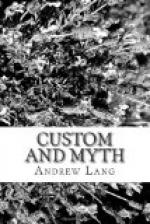In his polemic against Fetichism, it is not always very easy to see against whom Mr. Muller is contending. It is one thing to say that fetichism is a ‘primitive form of religion,’ and quite another to say that it is ‘the very beginning of all religion.’ Occasionally he attacks the ‘Comtian theory,’ which, I think, is not now held by many people who study the history of man, and which I am not concerned to defend. He says that the Portuguese navigators who discovered among the negroes ’no other trace of any religious worship’ except what they called the worship of feiticos, concluded that this was the whole of the religion of the negroes (p. 61). Mr. Muller then goes on to prove that ’no religion consists of fetichism only,’ choosing his examples of higher elements in negro religion from the collections of Waitz. It is difficult to see what bearing this has on his argument. De Brosses (p. 20) shows that he, at least, was well aware that many negro tribes have higher conceptions of the Deity than any which are implied in fetich-worship. Even if no tribe in the world is exclusively devoted to fetiches, the argument makes no progress. Perhaps no extant tribe is in the way of using unpolished stone weapons and no others, but it does not follow that unpolished stone weapons are not primitive. It is just as easy to maintain that the purer ideas have, by this time, been reached by aid of the stepping-stones of the grosser, as that the grosser are the corruption of the purer. Mr. Max Muller constantly asserts that the ’human mind advanced by small and timid steps from what is intelligible, to what is at first sight almost beyond comprehension’ (p. 126). Among the objects which aided man to take these small and timid steps, he reckons rivers and trees, which excited, he says, religious awe. What he will not suppose is that the earliest small and timid steps were not unaided by such objects as the fetichist treasures—stones, shells, and so forth, which suggest no idea of infinity. Stocks he will admit, but not, if he can help it, stones, of the sort that negroes and Kanekas and other tribes use as fetiches. His reason is, that he does not see how the scraps of the fetichist can appeal to the feeling of the Infinite, which feeling is, in his theory, the basis of religion.
After maintaining (what is readily granted) that negroes have a religion composed of many elements, Mr. Muller tries to discredit the evidence about the creeds of savages, and discourses on the many minute shades of progress which exist among tribes too often lumped together as if they were all in the same condition. Here he will have all scientific students of savage life on his side. It remains true, however, that certain elements of savage practice, fetichism being one of them, are practically ubiquitous. Thus, when Mr. Muller speaks of ’the influence of public opinion’ in biassing the narrative of travellers, we must not forget that the strongest




